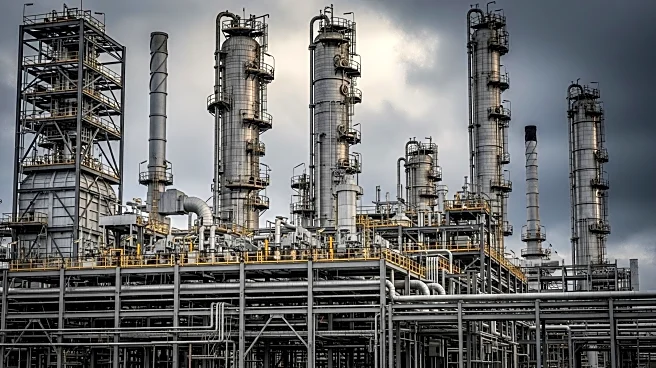What is the story about?
What's Happening?
Nigeria's largest oil refinery, owned by Aliko Dangote, is experiencing significant operational disruptions due to protests by the Petroleum and Natural Gas Senior Staff Association of Nigeria (PENGASSAN). The union has moved to shut down operations in response to the alleged dismissal of over 800 workers, many of whom are reportedly linked to union membership. This marks the first major disruption at the refinery since it began operations earlier this year. PENGASSAN claims that the refinery has been completely shut down, with significant impacts on the fertilizer plant and diesel production. The union has extended its actions to all oil installations nationwide, although Dangote Industries has not confirmed the operational status of the refinery. The management of the refinery has labeled the shutdown as 'economic sabotage' and is urging for negotiations to prevent prolonged disruptions.
Why It's Important?
The disruption at Dangote's refinery highlights ongoing tensions between labor unions and management within Nigeria's petroleum sector, where unions hold considerable influence. The standoff could have widespread implications, potentially affecting supply chains from crude deliveries to gas processing and fertilizer exports. For Aliko Dangote, the world's richest Black businessman, this dispute adds to the challenges of launching Africa's largest refinery project amid a turbulent economic climate. The unrest threatens to undermine Dangote's plans to transform Nigeria's fuel distribution network and could slow efforts to boost domestic supply and capture export markets. The situation underscores the critical role of labor relations in the stability and growth of Nigeria's oil sector.
What's Next?
The Nigerian Upstream Petroleum Regulatory Commission (NUPRC) is calling for both parties to return to the negotiating table to resolve the dispute. The outcome of these negotiations will be crucial in determining the future operational stability of the refinery. If unresolved, the industrial unrest could continue to disrupt operations, affecting not only the refinery but also the broader Nigerian oil sector. The situation may also prompt regulatory and governmental intervention to ensure the continuity of essential petroleum supplies and to safeguard the country's economic interests.
















